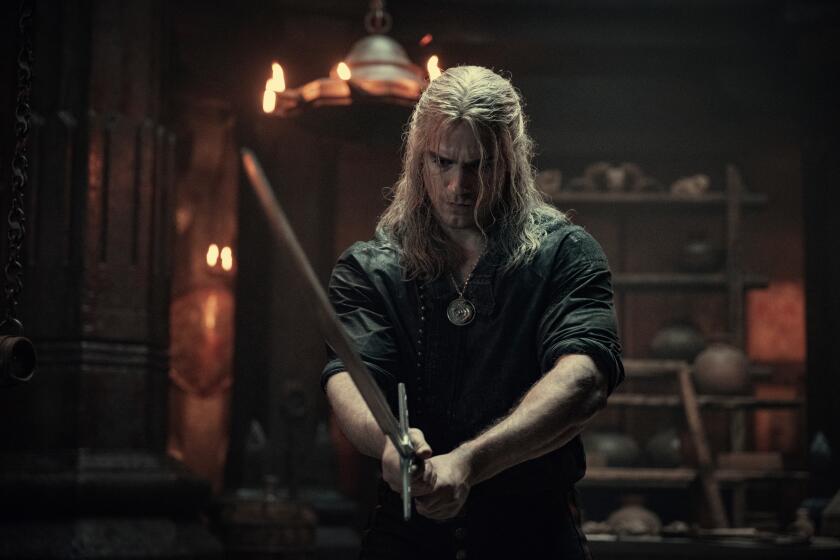Greater than sum of her parts
Tara is the typical American woman -- a wife, a mom and a working professional -- you know, totally insane.
In Showtime’s “The United States of Tara,” created by Oscar-winning screenwriter Diablo Cody and based on an idea from executive producer Steven Spielberg, the clashing identities of the title character go far deeper than the norm. Tara, played by actress Toni Collette, is host to multiple distinct personalities which silently surface and disappear depending upon the often capricious circumstances of her colorful suburban life.
In one moment, as Tara she fights with her children about schools, friends and that morning-after pill she found but doesn’t remember buying for her daughter. In another, she’s “T,” a teenager who wants to take her daughter on a shopping spree with Tara’s plastic, complains about her host’s old body, and comes on to her husband (John Corbett) -- only to be turned away. In still another, she’s a he, “Buck,” a fan of beer, bowling and strip clubs.
Tara is a nation and person divided -- she struggles with Dissociative Identity Disorder (DID), what used to be known as multiple personality disorder. And as you may have realized, she is a metaphor for the modern woman.
“Everybody dissociates to a degree,” says Cody, who wants her main character to be three-dimensional, and not tragic or mentally crippled. “It’s essential in this society, we don’t have clear-cut roles anymore. You might have to be a parent in the morning . . . and sexual at night.”
A native of Australia, Collette is probably best known for her string of unusual but endearing film characters, including the ABBA-obsessed girl in “Muriel’s Wedding,” the suicidal mother in “About a Boy” and the offbeat mom in “Little Miss Sunshine.” Her familiarity with odd, complex characters will serve her well in her first series for American television, where the appetite for programs about dysfunctional families seems insatiable.
In talking about her character, Collette references one of her favorite books, “The Private Lives of Pippa Lee,” by Rebecca Miller. Like the new television show, the book delves into the hardships of reconciling the often contradictory demands of womanhood.
That book, says Collette, “goes beyond the facade of this woman in her middle-age, and goes into how people really do change, and have different phases in their lives, and there are different characters and different personalities living within each of us. . . . Certainly there are times where, like if I’d met you 10 years ago, it’d be completely different. You might have met me dancing on a bar. So . . . I think we’re all capable of many different things.”
A recent day at the Los Angeles set of the Showtime show finds a slim Collette, dressed casually in jeans and a button-down shirt, and engaged in a short scene with her character’s therapist, Dr. Ocean (Valerie Mahaffey) where she congratulates her patient on a breakthrough of co-consciousness. But in the next breath, the therapist tells Tara this means she’ll now need a new, more DID-experienced, mental health professional.
“You’re breaking up with me?” Tara asks in disbelief.
Collette admits DID is a challenging subject to examine in a realistic yet comedic tone.
“It’s a fine line, certainly,” she says. “I find, in general, I kind of gravitate toward scripts and stories that do represent life in that way. It’s neither black or white, funny or sad, it’s a hodgepodge of all those things.”
In the pilot episode, Tara deliberately stops taking her DID medication, which had left her more zombie than human. The family plan is to embrace all her personalities and try to learn from them.
“I think this is one of the things that gives it so much heart -- that they’re so supportive of her and they all want her to be better, because it will affect all their lives,” says Collette, who, along with the creators, consulted not only DID experts but patients as well.
As Tara’s husband, Max, Corbett plays a big part in bringing fun to the family and the set. A working-class guy, the character is a landscaper, but as showrunner Alexa Junge puts it, he’s the glue for the fictional family.
“They’re not rich,” says Corbett, who comes across as affable and easygoing, like his character. “I think he would love to come home and have his wife make him a Salisbury steak with some mashed potatoes and watch a little ESPN. That doesn’t work out for this guy. He’s basically got three teenagers some days, he’s got a wife for a portion of it.”
Before rehearsal, he hangs with two of his own family: happy, huge dogs that take up most of the space in his trailer. He has a fairly looser take on the show’s approach to DID.
“We can make fun of it every episode, or never deal with it,” he says. “Just deal with family stuff. As long as the writing’s good, I don’t care. . . . I’m not the keeper of those gates.”
Corbett ambles to rehearsal and joins the entire cast, which is gathered in a kitchen set. They’ve worked together for months, and they tease each other like family. They have inside jokes, many of them beginning and ending with Corbett, who at this rehearsal is intent on blocking every moment of the scene amid a chorus of “C’mon, Corbett!”
Collette, the center of the show’s drama and the source of most of its comedic moments, likens working in TV to being on a train, or “a set of waves that just keep coming so you just keep jumping over them and going with the flow. . . . The story’s unfolding and being molded around all of us, so you’re part of something that’s still growing.”
Tara’s often disbelieving, jealous sister Charmaine is played by “Rachel Getting Married’s” Rosemarie Dewitt. In the rehearsal, Charmaine enters with Tara, who, as T, wears a ponytail and drips teen angst and attitude and who just got them kicked out of a relaxing spa session.
The whole cast hollers “Marshall!” as Tara’s sensitive son, played by Keir Gilchrist, makes his entrance to rehearsal. The director keeps the train moving, but gets his fair share of razzing when he moves on from the current scene and appears to be walking the cast through the entire script.
Corbett baits him: “Hey, I have a problem with next week’s script. Can we go over that one too?” When the director fires back that they don’t have him next week, the entire cast teases him that he can never leave, he’s stuck with them like a weird uncle who watches over them.
And though this scripted family’s dysfunction may seem more dramatic than most, at its heart, the group struggles as all families do, Junge says. To her, the members are heroic in their ap- proach to life which seeks “to have a high quality, great life with a lot of fun even with what’s going on.”
“The family’s so real and it’s beautifully told because they’re embracing all of these problems that create dysfunction,” Collette says. “There’s nothing like it.”
--
The complete guide to home viewing
Get Screen Gab for everything about the TV shows and streaming movies everyone’s talking about.
You may occasionally receive promotional content from the Los Angeles Times.



